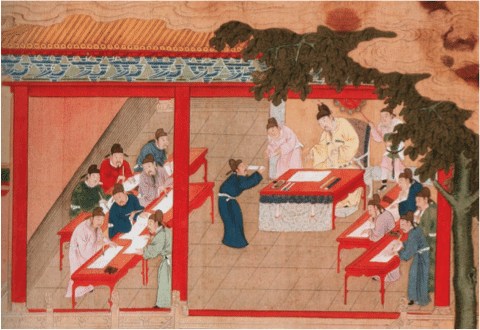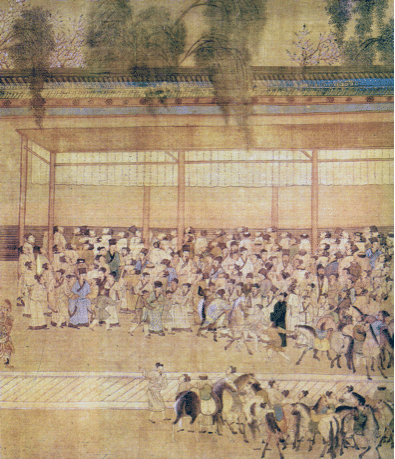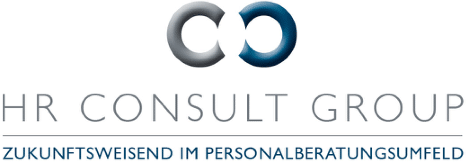In addition to professional qualifications, known as "hard facts," soft skills also play an important role in ensuring long-term employment within a company. These are verified through scientifically based aptitude testing, which is a key focus at HR Consult Group AG. But when and where did aptitude testing actually begin? How has it developed?
There are many references to early pioneers of aptitude testing throughout world history. One example is ancient China, where high-ranking public officials were selected using a standardized selection procedure. Applicants had to perform five arts and also demonstrate knowledge of rites and public ceremonies. The exams were very demanding, so that the proportion of applicants who were ultimately accepted was extremely low.

Source: Wikipedia (SONGDYNASTIE.JPG)
Sir Francis Galton (1822-1911) from England goes down in history as one of the most important pioneers in the field of aptitude testing. He made a name for himself due to his versatility in various disciplines. These included differential psychology, of which Galton was a co-founder. This discipline deals with the differences between individuals in terms of psychological characteristics and states. To this end, he developed test procedures that could measure psychological characteristics. He strove to quantify these characteristics as accurately as possible and dealt with both intellectual abilities and personality traits. In doing so, he always kept his goal of improving the human race in mind.
He also developed the principle, still used today, of describing people by the deviation of their "measured value" from the mean value of a comparison group.
Since 1884, interested parties have been able to have their psychological characteristics tested by him in London. Characteristic of aptitude diagnostics were basic characteristics such as behavioral observation when solving difficult tasks and the assessment of self-image and external image.
The first standardized personality assessment methods emerged at the beginning of the 20th century through empirical psychological approaches. This was followed by an increase in standardization and systematization. These early personality tests were mainly used to distinguish adaptable and functional people from those with deviant behavior.

Source: Wikipedia (BEAMTENPRÜFUNGEN1.JPG)
The first personality tests of American origin were intended for use in military psychological examinations or for questions in clinical psychology. To a large extent, they covered constructs of psychology.
The first career-related procedures were developed in 1920. These already dealt with intellectual characteristics. They were used to determine suitability for a particular profession or to predict professional success. The first significant procedure of this kind was developed at the Carnegie Institute of Technology in Pittsburgh. This test was based on around 1,000 questions on various professional interests, which are still used today as a source for new procedures.
The use of clinically oriented personality tests for military purposes had already proven successful, leading to the development of tests for psychopathological disorders (pathological changes in consciousness, memory, and emotional or mental life). The MMPI (Minnesota Multiphasic Personality Inventory) was designed specifically for this purpose. Finally, the California Psychological Inventory (CPI) was introduced, a procedure closely based on the MMPI, but used primarily for the selection of managers.
Our next article in this series will cover the rest of the story up to the present day.
If you have any further suggestions or questions on this topic, please feel free to contact us at k.rasthofer@senator-partners.de.
About the author

After completing his studies in automotive engineering and industrial engineering, he began his professional career in the automotive industry in the areas of sales, development, and marketing, and also spent a year in Japan with one of the largest automotive suppliers.
He then moved to a world-renowned premium car manufacturer, where he was responsible for product marketing for Japan and South America as well as marketing strategy for North and South America.
In 1994, he decided to become self-employed and founded a personnel consulting firm in Munich, where he has been driving development and expansion for over 20 years. As managing director, his industry focus is naturally on the automotive world as well as mechanical and plant engineering.
His doctorate in the field of aptitude diagnostics ideally complements his areas of expertise, particularly in relation to human resources and management consulting. His dissertation deals with the identification and verification of typical personality traits of engineers and the definition of areas of development for a successful career.
These are scientifically derived and presented in the book "Eignungsdiagnostik im Praxiseinsatz" (Aptitude Diagnostics in Practical Use).
At the same time, he focuses on establishing networks and cooperation models as well as the continuous development of systems and processes in HR consulting.
Over the past 20 years in HR consulting, he has developed several brands that continue to operate successfully on the market today.



